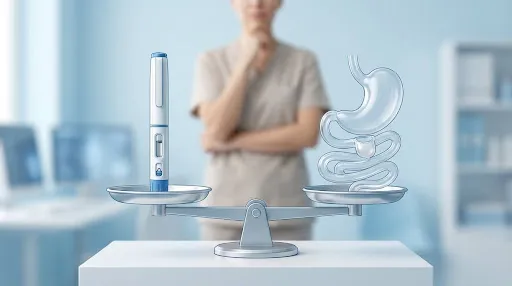Step on the scale one morning and notice the number is higher than expected. It’s natural to wonder, does spironolactone cause weight gain? This medication is widely prescribed for high blood pressure, PCOS, acne, and even hormone-related conditions. Because it balances hormones and reduces fluid retention, many patients worry about spironolactone weight gain, spironolactone bloating, or even spironolactone belly fat. The truth, however, is not straightforward. Whether you gain or lose weight on spironolactone often depends more on your underlying condition than on the medication itself. In this article, we’ll break down what the research and real-world experiences say about spironolactone and its link to weight changes.
Can Spironolactone cause weight gain?
Spironolactone does not directly cause fat-related weight gain. Most weight changes linked to spironolactone come from water balance shifts, hormone-related fat redistribution, or the condition being treated (such as PCOS or hormone therapy), not the medication itself. In many cases, people initially lose water weight, while others notice temporary bloating or body shape changes without actual fat gain.
Important points to note:
-
Fluid changes ≠ fat gain: Spironolactone helps your body shed excess water, so sudden weight changes are usually due to fluid shifts, not true fat accumulation.
-
Your condition matters: PCOS, hormonal acne, and heart failure can independently affect weight, regardless of spironolactone.
-
Lifestyle factors play a role: Diet, stress, and other medications often have more influence on body weight than spironolactone itself.
In short, spironolactone is not a “weight-gain drug,” but your personal experience may vary depending on why you’re taking it and how your body responds.
Let's dive into it in more detail in the next section.
Why Do Some People Report Weight Gain on Spironolactone?
Here’s the thing: body changes are not always fat gain. Sometimes it’s fluid. Sometimes it’s hormones. Sometimes it’s lifestyle. That’s why spironolactone weight changes can look so different across patients:
1. Fluid Retention and Bloating
Ironically, spironolactone is supposed to reduce water, but some people still report spironolactone water retention. This can show up as:
-
Puffy fingers or ankles
-
Stomach swelling that looks like spironolactone belly fat
-
Short bursts of spironolactone bloating, especially when starting the drug
Most of this is temporary. Clothes feel tighter for a while, then symptoms settle.
2. Hormonal Changes and PCOS Factors
PCOS is a common reason for spironolactone prescriptions. The real issue here isn’t the pill. It’s insulin resistance. When insulin is high, the body stores fat more easily and craves food. That means spironolactone and weight gain in PCOS patients often reflect the condition itself. Hormonal imbalance can also fuel fat storage, especially around the stomach.
Up to 90% of women with PCOS have insulin resistance, according to the National Institutes of Health.
3. Fat Redistribution in Hormone Therapy
Spironolactone is part of feminizing hormone therapy. With estrogen, body fat redistributes. Thighs, hips, and belly areas gain softness. Muscle mass decreases. In one study, about 21% of transgender women gained more than 5 kg. So yes, spironolactone body changes are real in therapy, but it’s part of the transition process, not the drug causing fat by itself.
4. Lifestyle and Metabolism Effects
Side effects like dizziness or tiredness make people less active. Add in a slightly slower spironolactone metabolism, and workouts may feel harder. A missed run here. A skipped gym day there. Over months, this adds up. That’s why spironolactone weight changes sometimes reflect lifestyle shifts.
Spironolactone and Weight: What the Research Reveals
Clinical data rarely link spironolactone directly to fat gain. In fact, many cardiac patients lose weight from reduced swelling. In PCOS, weight challenges are connected to insulin resistance.
In hormone therapy, spironolactone and fluid retention combined with estrogen naturally reshape the body. Spironolactone weight loss vs weight gain depends entirely on why the drug is prescribed. Experts reviewing studies concluded that spironolactone side effects weight gain, are overstated.
Real Experiences: What Patients Say
Online forums tell the story better than research sometimes. One woman with PCOS posted that spironolactone made her stomach feel bloated. Another man on blood pressure medication said he lost weight within weeks because water left his body.
A transgender woman explained how spironolactone's body changes made her jeans fit differently, even though the scale barely moved. Across Reddit and Quora, spironolactone weight gain stories usually trace back to bloating or hormone effects, not fat gain.
Does Spironolactone Cause Bloating or Water Retention?
No, but PCOS often does. According to the CDC, insulin resistance significantly increases obesity risk in PCOS.
Key drivers of weight changes in PCOS:
-
Insulin blocks fat breakdown
-
Hormonal imbalance alters fat storage
-
Fatigue reduces physical activity
Spironolactone improves androgen-related symptoms, not metabolic ones.
Does Spironolactone Cause Weight Gain in PCOS?
PCOS makes weight control hard. Up to 90% of women with PCOS deal with insulin resistance. High insulin keeps fat stored and drives cravings. So, spironolactone and weight gain in PCOS patients have less to do with the pill and more to do with the disease itself.
What really drives the numbers up:
-
Insulin blocks fat breakdown
-
Testosterone stimulates the appearance of spironolactone's belly fat appearance
-
Difficulty sustaining exercise due to fatigue
Spironolactone treats acne and hair issues in PCOS, but it doesn’t fix the root cause of weight struggles.
Does Spironolactone Cause Weight Gain in Women on Hormone Therapy?
In transgender women, spironolactone is paired with estrogen. This combination reshapes fat and reduces muscle. For many, that looks like spironolactone weight gain. In truth, it’s redistribution.
Patterns include:
-
Hips and thighs are filling out
-
The belly fat is slightly increasing
-
Lower calorie burn from less muscle
So, spironolactone body changes in therapy should be seen as expected outcomes, not side effects to panic over.
How to Manage Weight Changes While Taking Spironolactone
People worry about spironolactone and weight gain, but there are practical steps. Doctors encourage lifestyle tracking and small changes.
Try this:
-
Track spironolactone weight changes weekly, not daily.
-
Reduce sugar intake to offset insulin resistance.
-
Stay consistent with exercise, even if energy dips.
-
Watch salt intake to reduce spironolactone water retention.
-
Discuss long-term spironolactone metabolism changes with your provider.
With awareness, most patients manage spironolactone weight loss vs weight gain without big issues.
Timeline of Weight Changes After Starting Spironolactone
Weight changes on spironolactone tend to follow a predictable timeline. Understanding this helps reduce unnecessary worry.
Weeks 1 to 3:
Many people notice slight weight loss from reduced water retention. Some may experience bloating as electrolyte levels adjust.
Weeks 4 to 8:
Fluid balance stabilizes. Temporary bloating usually improves. Weight often returns to baseline.
After 3 months:
Any ongoing weight change is usually related to hormones, lifestyle habits, or conditions like PCOS rather than the medication.
If weight continues to increase beyond this point, doctors typically evaluate diet, insulin resistance, and activity levels. Early changes are fluid-related. Long-term changes are rarely caused by spironolactone.
When to Talk to Your Doctor About Weight Changes
Medical advice is important if weight changes are sudden or persistent.
Contact your healthcare provider if:
-
Weight increases rapidly
-
Swelling becomes painful or does not improve
-
You experience shortness of breath
-
Fatigue worsens significantly
-
Weight gain continues beyond three months
Doctors may check electrolytes, insulin levels, thyroid function, or adjust dosage if needed. Persistent or severe changes should always be evaluated.
Conclusion
So, does spironolactone cause weight gain? Most evidence says no. The drug itself doesn’t make the body pack on fat. What patients notice, spironolactone bloating, spironolactone water retention, spironolactone body changes, comes from PCOS, hormone therapy, or lifestyle factors.
The medication helps with acne, heart failure, and hormone balance. If weight shifts happen, they are usually temporary or tied to another cause. Always check with a doctor before making changes.
Frequently Asked Questions
Does spironolactone affect metabolism?
Spironolactone metabolism impact is indirect. It can make people less active, but it doesn’t directly slow down metabolic rate.
Can spironolactone cause permanent bloating?
No. Spironolactone bloating usually fades as the body adjusts. Persistent swelling should be checked with a doctor.
Does spironolactone increase belly fat?
Reports of spironolactone belly fat often come from hormone therapy or PCOS, not the drug itself.
Why do some lose weight while others gain?
Spironolactone weight loss vs weight gain depends on the condition being treated; heart patients often lose water weight, while hormone therapy shifts fat.
Should I stop spironolactone if I gain weight?
Not without medical advice. Spironolactone side effects, such as weight gain, are uncommon. Often, the cause is fluid or hormone changes.
What are the significant side effects of Spironolactone?
The significant side effects of Spironolactone may include smelling pee, feeling thirsty, and dizziness.
Reviewed by







